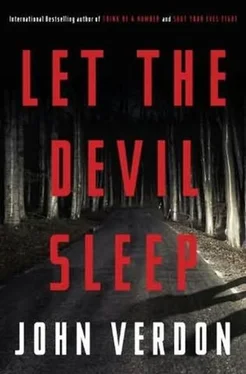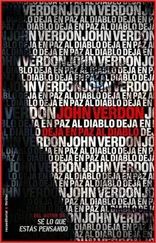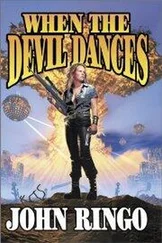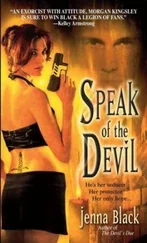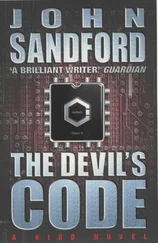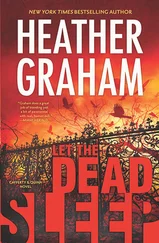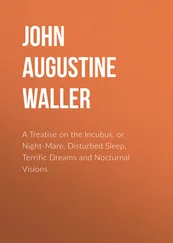“Love you,” he said.
“Love you,” she said.
Five minutes after that, when he was about a mile down the mountain road, he saw a Priority Mail truck coming up toward him. There were only two other houses between that point and his own, both occupied mainly on weekends, meaning that the delivery was probably for him or for Madeleine. He pulled over and waved as he got out of his car.
The driver stopped, recognized him, retrieved a Priority envelope from the back of the truck, and handed it to him. After the exchange of a few commiserating words about the too-chilly spring, the driver departed and Gurney opened the envelope, which was addressed to him.
Inside the outer envelope was a plain manila envelope, which he also opened, extracting a single sheet of paper. He read:
Greed spreads in a family like septic blood in bathwater. It infects everyone it touches. Therefore the wives and children you hold up as objects of sorrow and pity shall also be cut down. The children of greed are evil, and evil are those whom they embrace. Therefore they, too, shall be cut down. Whomsoever you hold up for the fools of the world to console, they all shall be cut down, whether related by blood or by marriage to the children of greed .
To consume the product of greed is to consume its stain. The fruit leaves its mark. The beneficiaries of greed bear the guilt of greed, and they must bear its punishment. They will die in the spotlight of your praise. Your praise shall be their undoing. Your pity is a poison. Your sympathy condemns them to death .
Can you not see the truth? Have you gone blind?
The world has gone mad. Greed masquerades as laudable ambition. Wealth pretends to be proof of talent and worth. The channels of communication have fallen into the hands of monsters. The worst of the worst are exalted .
With devils in pulpits and angels ignored, it falls to the honest to punish what the mad world rewards .
These are the true and final words of the Good Shepherd .
Invitation to the Party
As Gurney turned onto Route 7, the main road through Sasparilla, his phone rang. The ID said it was Kyle, but the voice was Kim’s.
The guilt and anger of the previous day’s call had been replaced by shock and fear. “Something came a minute ago by rush mail… from him … the Good Shepherd… It talks about people being cut down… people dying.”
Gurney asked her to read it to him. He wanted to be sure it was the same message he’d received himself.
It was identical.
“What should we do?” she asked. “Should we call the police?”
Gurney told her that he’d received the same message and that he was only minutes away from a meeting at which he’d be passing it along to the state police and the FBI. But he did have a question for her. “How was the envelope addressed?”
“That’s the scariest part.” Her voice was trembly. “The outer envelope was addressed to Kyle here at his apartment, but there was a second envelope inside it that had my name on it-which means the Good Shepherd must know I’m here, that we’re here together. How could he know that?”
When Meese’s nasty phone message had prompted Madeleine to ask a similar question the night before, Gurney had dismissed the possibility of a physical tail. Now he wasn’t so sure.
“How could he know?” Kim repeated, her voice rising.
“He might not actually know that you’re there together. He might just believe that Kyle would have a way of reaching you, of getting the message to you.” Even as he was saying this, he realized it didn’t make a lot of sense, that he was mainly trying to calm her.
It didn’t seem to be working. “Overnight mail means he wanted me to get it this morning. And he used both our names. So he must know we’re both here! ”
That logic was less than perfect, but Gurney wasn’t about to debate it. For a moment he considered bringing the NYPD into the affair, if for no other reason than to get a uniform to pay them a visit, creating the illusion of protection. But the confusion, crossed wires, and need for explanations that would ensue outweighed the practical benefits. The bureaucratic bottom line was that there was no concrete evidence of an imminent threat to them, and involving the NYPD would likely start with an argument and end in a mess.
“Here’s what I want you to do. I want you to stay in the apartment-both of you. Make sure the door is locked. Don’t open it for anyone. I’ll call you again after my meeting. In the meantime if there’s any tangible threat-or any communication at all beyond the message you’ve already received-call me immediately. Okay?”
“Okay.”
“Now, let me ask you about something else: Can you access the video record of your interview with Jimi Brewster?”
“Yes, sure. I have a copy right here on my iPod.”
“With you?”
“Yes.”
“In a format you can e-mail me?”
“Depends on how large a document your e-mail server will accept. I’ll reduce the resolution to minimize the file size, and there shouldn’t be any problem.”
“Fine, just so long as I know what I’m looking at.”
“You want me to send it right now?”
“Please.”
“Can I ask why?”
“Jimi Brewster’s name came up in another context. A conversation I had with Max Clinter. I’d like to get a better sense of who he is.”
As Gurney ended the call, he was turning into the parking lot of New York State Police Zone Headquarters. He passed a row of trooper cruisers and pulled in next to a gleaming silver BMW 640i.
An eighty-five-thousand-dollar flash-and-dash vehicle would be a questionable choice for a civil servant, but for a high-flying consultant who was moving up in the world it could make sense. It hadn’t occurred to him until then that Rebecca Holdenfield might be attending the meeting, but now he’d be willing to put even money on it. It was her kind of car.
He checked his watch. He was five minutes early. He could use the time to return Connie Clarke’s call, with an honest excuse to keep the conversation short in case she actually picked up. As he was retrieving her number, one of the NYSP’s black Crown Victorias pulled in beside him. Bullard was in the passenger seat, and Andy Clegg was driving.
Bullard motioned to Gurney to join them, pointing toward the big sedan’s rear seat. He did as he was bidden, bringing his Priority Mail envelope with him.
Bullard began speaking like someone who’d carefully thought through what she wanted to say. “Good morning, Dave. Thanks for coming on short notice. Before we go inside, I wanted to make you aware of my position. As you know, BCI’s Auburn unit is investigating the murder of Ruth Blum. The murder may or may not be related to the ten-year-old Good Shepherd case. We may be dealing with the same perp, or a copycat, or with some third option still undefined.”
To Gurney there was no possibility of any “third option”-but he understood that Bullard wanted to establish the broadest rationale for retaining investigative control.
She went on. “I understand that there’s an established theory of the original case, and I understand that you’ve been questioning it aggressively. I want you to know that I come to the table with an open mind. I have no vested interest in any particular version of the truth. I also have no interest in ego-driven pissing matches. My interest is in facts. I have a great fondness for them. I asked you to join us this morning because I sensed that you might share that fondness. Any questions?”
It all sounded as straightforward as Bullard’s clear, forceful voice. But Gurney knew that the reality of the situation had another layer. He was pretty sure he’d been invited because Bullard had discovered, probably from Daker, that he’d gotten under Trout’s skin-meaning that his unstated role was to complicate the chemistry of the meeting and keep Trout off balance. In short, he was there as a wild card in Bullard’s hand.
Читать дальше
